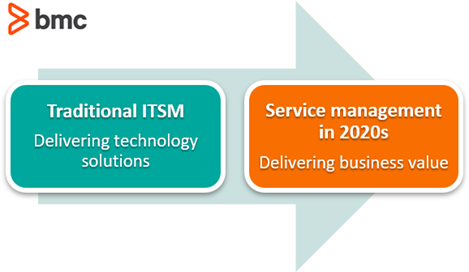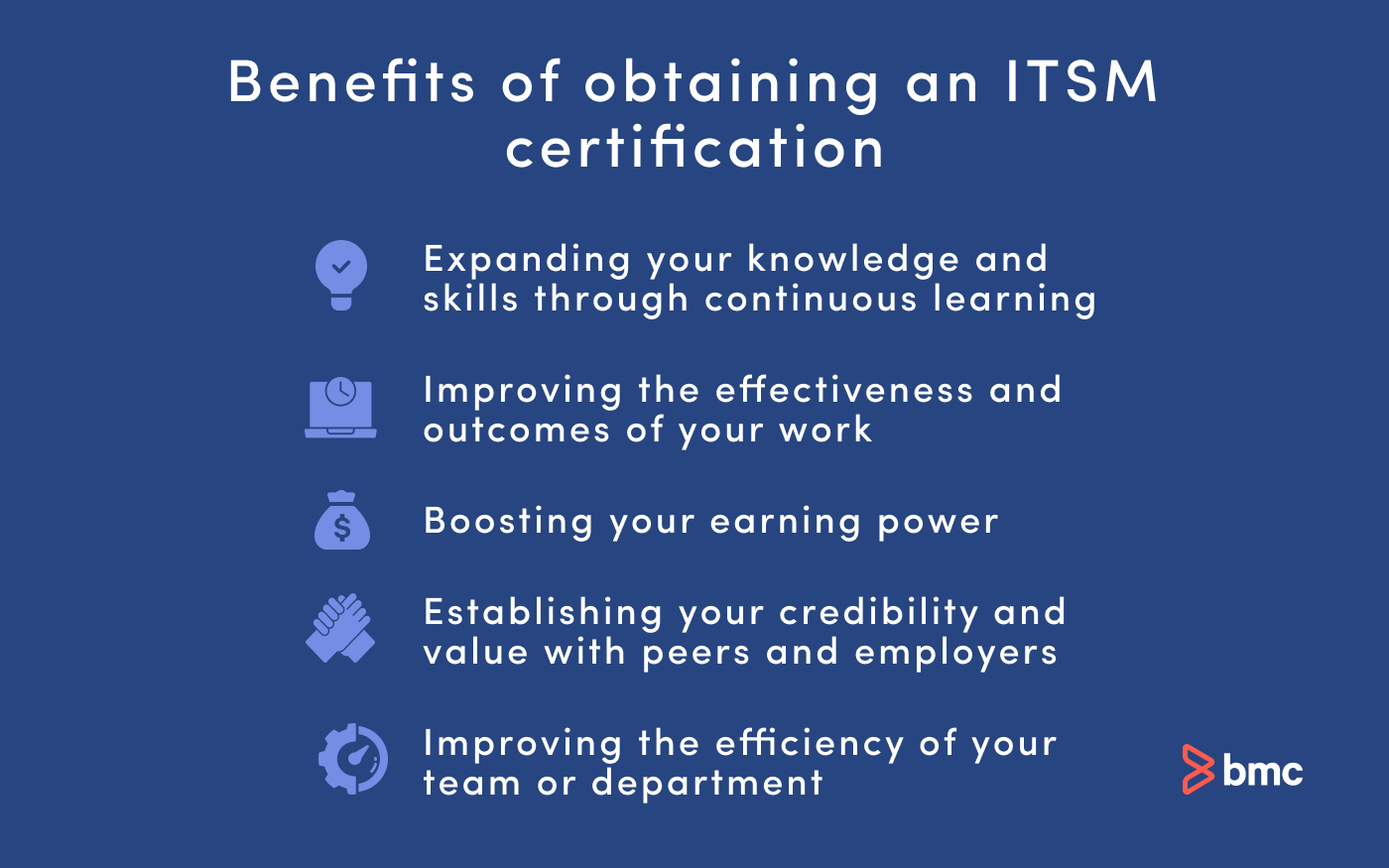ITSM Certifications for 2024: A Beginner’s Guide


If you are involved in any position in the technology sector, you are familiar with ITSM. Short for IT Service Management, ITSM is the entirety of all IT-related activities within an organization. ITSM is highly customer focused, and includes the planning, designing, delivering, operating, and controlling of IT processes or operations.
Of course, ITSM has changed in recent years. ITSM expert Kirstie Magowan details how IT and business are converging. This means that IT’s role shifts from providing technology solutions to delivering business value.
 Given its popularity and relevance, obtaining ITSM training is no longer just beneficial—it’s almost a necessity. Luckily, there are a wide variety of ITSM certifications available, whether you are new to the scene entirely or are looking to enhance your current skill set. We’ll take a look at certifications from:
Given its popularity and relevance, obtaining ITSM training is no longer just beneficial—it’s almost a necessity. Luckily, there are a wide variety of ITSM certifications available, whether you are new to the scene entirely or are looking to enhance your current skill set. We’ll take a look at certifications from:
ITSM certification is a credential that verifies your competence in the field of IT processes. When you pursue ITSM training, you will need to master several critical subjects. Typical ITSM courses cover IT process planning and design and how to maintain them, best practices in delivering IT services, problem management and resolution, how to manage technology assets, and the basics of knowledge management.
 Earning your ITSM certification will provide you with benefits that enhance your career, job satisfaction, and earning power. They include:
Earning your ITSM certification will provide you with benefits that enhance your career, job satisfaction, and earning power. They include:
When pursuing an ITSM certification, you can choose from several different levels. It depends on where you are in your career, how much work experience you have, and what your ultimate career goals may be. You can choose to learn in person or earn the credential online.
With so many ITSM training providers and a variety of ITSM courses, you can expect costs to be all over the place. Some ITSM certifications cost a few hundred dollars, while others are well into the thousands.
ITSM certification options depend on your starting skill and knowledge level. The right one for you depends on the specific training you need for the roles you seek, the kind of work you want to do, and the path you plan for your career. ITSM certification cost may also be a deciding factor. The best ITSM certifications will help you advance in your existing career, land a brand new job, or stay on top of trends.
One of the most common cross-platform certifications for ITSM is the ITIL Certification. Recognized as vendor neutral, ITIL certifications provide a modular approach to the ITIL framework itself, made up of a series of qualifications that are focused on different aspects of ITIL best practice to various degrees of depth and detail.
This tiered structure offers flexibility for candidates relating to their specific focus of discipline as well as key areas of interest. There are four certification levels within the ITIL 4 scheme:
Let’s look at each one.
Best for: IT professionals looking for an introduction to ITSM
The ITIL 4 Foundation certification is designed as an introduction to ITIL 4, enabling candidates to look at ITSM through an end-to-end operating model for the creation, delivery and continual improvement of tech-enabled products and services.
This IT service management certification can help those who require a basic understanding of the ITIL framework, those who want to use ITIL to enhance ITSM, or those whose organization has recently adopted ITIL and would like a general understanding of it.
Certification components:
Best for: IT practitioners managing teams
The ITIL 4 Managing Professional certification (ITIL MP) is a stream of four modules:
This IT service management certification provides practical and technical knowledge about how to run successful IT-enabled services, teams, and workflows. It covers the core service management activities and focuses on all types of engagement interaction between a service provider and their customers, users, suppliers, and partners.
Certification components:
Best for: Senior IT leaders and executives
The ITIL4 Strategic Leader certification (ITIL SL) is a stream of two modules:
This certification demonstrates that the candidate has a clear understanding of how IT influences and directs business strategy. It provides methods for current and aspiring IT leaders to build and implement digital ideas that can face new technological challenges and competition while driving success.
Certification components:
Best for: Senior IT leaders and executives who want to demonstrate deep ITSM knowledge
The ITIL Master certification validates the candidate’s ability to apply the principles, methods, and techniques from ITIL in the workplace. This certification is awarded upon successful achievement of the Practice Manager, Managing Professional and Strategic Leader designations.
CompTIA is one of the top tech associations in the world, serving as both an action leader and a thought leader for IT and tech companies. CompTIA IT certifications are recognized world-wide, setting industry standards and encouraging continuing education for life.
Best for: Beginner IT professionals
The CompTIA A+ certification is an industry standard for new professionals interested in starting a career in IT. This ITSM certification verifies that the candidate is able to support today’s core technologies, such as security, cloud, data management, and more.
Certification components:
Best for: Aspiring network and cybersecurity specialists
The CompTIA Network+ certification is for individuals looking to develop a career in IT infrastructure involving troubleshooting, configuring, and managing networks. The certification ensures that the candidate is able to use devices to create resilient networks and can implement security, standards, and protocols on them.
Certification components:
Best for: Aspiring cybersecurity specialists
This credential is essential when starting your career in the cybersecurity field. In pursuing your CompTIA Security ITSM, you will learn about the most recent advancements in technologies, terms, techniques and tools used in cybersecurity today.
Certification components:
HDI uses partnerships to educate thousands of organizations on how to improve customer service and service management performance. Each HDI ITSM certification reflects the level of knowledge required for specific roles, from careers just starting out in the industry to more advanced positions requiring multiple promotions.
Best for: IT support professionals looking to improve customer service skills
The HDI Customer Service Representative certification verifies that the IT professional is knowledgeable in the skills required to provide exceptional customer service and support, whether in a call center or a support center. This certificate ensures that the candidate understands how to not only anticipate a customer’s needs but also how to meet them while exceeding their expectations.
Certification components:
Best for: Service and support analysts looking to improve incident management skills
The HDI Support Center Analyst certification validates that the candidate knows how to provide the highest quality of customer care with every service interaction. This ITSM certification focuses on support center strategies for effective customer service, emphasizing problem-solving and trouble-shooting skills, contact handling procedures, incident management, communication skills, and an introduction to the service management process.
Certification components:
Best for: Desktop and advanced technicians
The HDI Desktop Advanced Support Technician certification validates that the IT professional possesses the required best practice knowledge and skills to provide quality technical support and guidance to stakeholders. This ITSM certification focuses on the integral role and value of a desktop advanced support technician throughout all areas of the organization.
Certification components:
Best for: Support center team lead or a supervisor
The HDI Support Center Team Lead certification ensures that the candidate has the necessary leadership skills to provide operational support to the organization and the coaching skills necessary to promote staff development. This ITSM certification is designed to help support professionals develop fundamental management and leadership skills.
Certification components:
Best for: IT support center managers
The HDI Support Center Manager certification validates that the candidate has the required knowledge and skills to successfully manage both the tactical and operational components of a support organization. This certification focuses on how managers can satisfy operational demands and build a support center that aligns with the organization, adds value to the business, and delivers on its commitments.
Certification components:
Best for: New and experienced desktop support managers
The HDI Desktop Support Manager certification ensures that the IT professional has the skills needed to responsibly execute the operational and tactical plans of desktop support, while satisfying customer and business needs. This ITSM certification is appropriate for both new and experienced desktop support managers.
Certification components:
Best for: Seasoned technical service and support leaders
The HDI Support Center Director certification verifies that the support professional has the knowledge and skills needed to lead the service and support organization while increasing business value. This certification focuses on the development and execution of strategic plans that will take the organization to the next level.
Certification components:
Best for: Problem management practice/process managers, practitioners, and stakeholders
The HDI Problem Management Principles certification is intended for those who wish to gain a working knowledge of industry best practices related to problem management. This ITSM certification focuses on skills needed to plan and implement reactive and proactive problem management.
Certification components:
The KCS Academy is the only authorized certifying body for KCS®, the Knowledge-Centered Service methodology, and its related resources.
Best for: IT professionals looking to learn KCS basics
The KCS v6 Fundamentals certification validates that the IT professional has an awareness of knowledge management best practices and concepts of KCS. This certification ensures a consistent understanding of the KCS methodology for everyone in the organization.
Certification components:
Best for: Supervisors and project leaders for KCS adoption
The KCS v6 Practices certification validates that support center professionals possess the understanding of the Knowledge-Centered Service (KCS SM) methodology. This ITSM certification focuses on implementing the practical steps for capturing, structuring, and successfully reusing knowledge through the knowledge management process.
Certification components:
Best for: IT leaders looking to increase their COBIT framework knowledge
The COBIT Foundation certification validates the candidate’s knowledge of COBIT’s five basic principles:
This ITSM certification ensures that the IT leader has extensive knowledge of and experience with enablers for governance and management of enterprise IT.
Certification components:
No matter what field you decide to focus on, obtaining an ITSM certification provides valuable benefits not only for the individual, but for the organization as a whole. Continuing education will ensure that you stay on top of the current trends while adapting to the ever-evolving demands of IT service management.
For related reading, check out these articles: